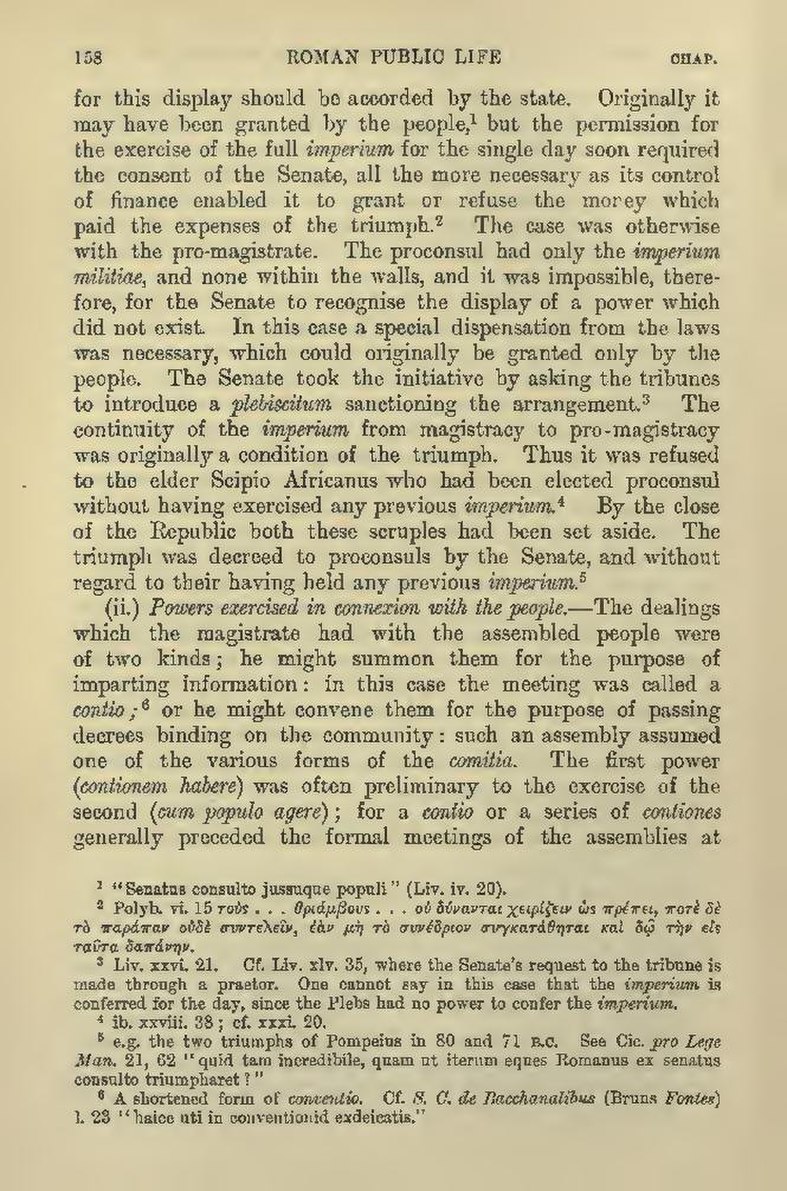for this display should be accorded by the state. Originally it may have been granted by the people,[1] but the permission for the exercise of the full imperium for the single day soon required the consent of the Senate, all the more necessary as its control of finance enabled it to grant or refuse the money which paid the expenses of the triumph.[2] The case was otherwise with the pro-magistrate. The proconsul had only the imperium militiae, and none within the walls, and it was impossible, therefore, for the Senate to recognise the display of a power which did not exist. In this case a special dispensation from the laws was necessary, which could originally be granted only by the people. The Senate took the initiative by asking the tribunes to introduce a plebiscitum sanctioning the arrangement.[3] The continuity of the imperium from magistracy to pro-magistracy was originally a condition of the triumph. Thus it was refused to the elder Scipio Africanus who had been elected proconsul without having exercised any previous imperium.[4] By the close of the Republic both these scruples had been set aside. The triumph was decreed to proconsuls by the Senate, and without regard to their having held any previous imperium.[5]
(ii.) Powers exercised in connexion with the people.—The dealings which the magistrate had with the assembled people were of two kinds; he might summon them for the purpose of imparting information: in this case the meeting was called a contio;[6] or he might convene them for the purpose of passing decrees binding on the community: such an assembly assumed one of the various forms of the comitia. The first power (contionem habere) was often preliminary to the exercise of the second (cum populo agere); for a contio or a series of contiones generally preceded the formal meetings of the assemblies at.]
- ↑ "Senatus consulto jussuque populi" (Liv. iv. 20).
- ↑ Polyb. vi. 15 [Greek: tous . . . thriambous . . . ou dynantai cheirizein hôs prepei, pote de to parapan oude syntelein, ean mê to synedrion synkatathêtai kai dô tên eis tauta dapanên
- ↑ Liv. xxvi. 21. Cf. Liv. xlv. 35, where the Senate's request to the tribune is made through a praetor. One cannot say in this case that the imperium is conferred for the day, since the Plebs had no power to confer the imperium.
- ↑ ib. xxviii. 38; cf. xxxi. 20.
- ↑ e.g. the two triumphs of Pompeius in 80 and 71 B.C. See Cic. pro Lege Man. 21, 62 "quid tam incredibile, quam ut iterum eques Romanus ex senatus consulto triumpharet?"
- ↑ A shortened form of conventio. Cf. S. C.de Bacchanalibus (Bruns Fontes) l. 23 "haice uti in conventionid exdeicatis."
